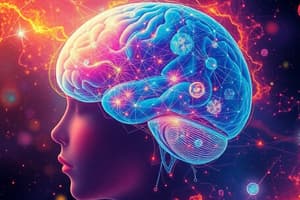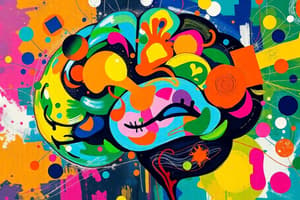Podcast
Questions and Answers
What analogy does Laurence Steinberg use to describe the teenage brain?
What analogy does Laurence Steinberg use to describe the teenage brain?
- A computer with fast processing but slow memory
- A rocket with powerful thrust but weak guidance
- A car with a good accelerator but a weak brake (correct)
- A ship with a strong engine but poor navigation
What was the outcome of the 2005 case discussed in the text?
What was the outcome of the 2005 case discussed in the text?
- The U.S. Supreme Court upheld the death penalty for crimes committed before age 18
- The U.S. Supreme Court allowed for harsher punishment for crimes committed before age 18
- The U.S. Supreme Court mandated life imprisonment for crimes committed before age 18
- The U.S. Supreme Court outlawed the death penalty for crimes committed before age 18 (correct)
What did Justice Anthony Kennedy emphasize about youths in the 2005 case?
What did Justice Anthony Kennedy emphasize about youths in the 2005 case?
- They are more mature and responsible than adults
- They are less susceptible to negative influences and peer pressure
- They have fully developed reasoning and judgment
- They show a lack of maturity and an underdeveloped sense of responsibility (correct)
What does the text suggest about the development of reasoning and judgment in the teenage brain?
What does the text suggest about the development of reasoning and judgment in the teenage brain?
What is the main reason cited by the state lawmakers for considering scaling back punitive juvenile justice laws?
What is the main reason cited by the state lawmakers for considering scaling back punitive juvenile justice laws?
Flashcards are hidden until you start studying
Study Notes
The Teenage Brain
- Laurence Steinberg uses the analogy of a "car with a good accelerator but a bad brake" to describe the teenage brain, highlighting its impulsive nature.
The 2005 Case
- The outcome of the 2005 case was that the Supreme Court ruled that the death penalty for juveniles was unconstitutional.
- Justice Anthony Kennedy emphasized that youths are less culpable than adults due to their immature brains and greater susceptibility to negative influences.
Development of Reasoning and Judgment
- The text suggests that the development of reasoning and judgment in the teenage brain is incomplete, leading to impulsive and risky decisions.
Juvenile Justice Laws
- State lawmakers are considering scaling back punitive juvenile justice laws primarily because they realize that the brains of teenagers are still developing and may not be fully capable of understanding the consequences of their actions.
Studying That Suits You
Use AI to generate personalized quizzes and flashcards to suit your learning preferences.




